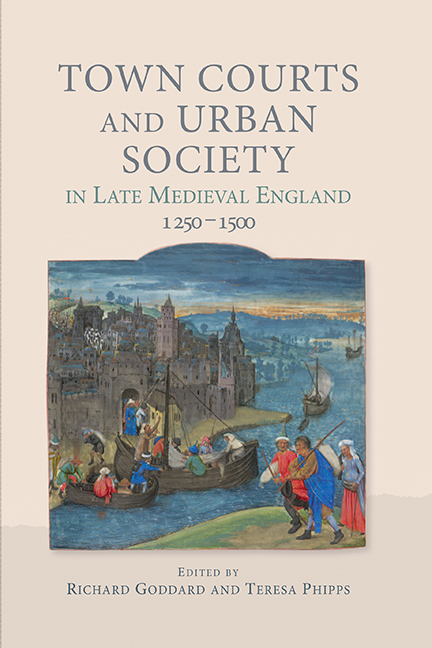Book contents
- Frontmatter
- CONTENTS
- List of Illustrations
- Contributors
- Acknowledgements
- List of Abbreviations
- Introduction
- Jane Laughton: In Memoriam
- 1 Town Courts in Medieval England: An Introduction
- 2 Borough Court Cases as Legal Precedent in English Town Custumals
- 3 The Priest of Nottingham and the Holy Household of Ousegate: Telling Tales in Court
- 4 Female Litigants and the Borough Court: Status and Strategy in the Case of Agnes Halum of Nottingham
- 5 Courts and Urbanisation: Jurisdiction in Late Medieval Seigneurial Boroughs and Towns
- 6 The Business of the Leet Courts in Medieval Norwich, 1288–1391
- 7 The Black Death and the Borough Court: The Changing Pattern of Social and Judicial Representation in Late Medieval Lincoln
- 8 Justice and Jurisdictions in Late Medieval Chester
- 9 Trust: Business Networks and the Borough Court
- 10 Society, Status and the Leet Court in Margery Kempe's Lynn
- Appendix: An Annotated List of Printed or Online Transcriptions and Translations of Medieval Town Courts in Britain to 1500
- Bibliography
- Index
5 - Courts and Urbanisation: Jurisdiction in Late Medieval Seigneurial Boroughs and Towns
Published online by Cambridge University Press: 14 September 2019
- Frontmatter
- CONTENTS
- List of Illustrations
- Contributors
- Acknowledgements
- List of Abbreviations
- Introduction
- Jane Laughton: In Memoriam
- 1 Town Courts in Medieval England: An Introduction
- 2 Borough Court Cases as Legal Precedent in English Town Custumals
- 3 The Priest of Nottingham and the Holy Household of Ousegate: Telling Tales in Court
- 4 Female Litigants and the Borough Court: Status and Strategy in the Case of Agnes Halum of Nottingham
- 5 Courts and Urbanisation: Jurisdiction in Late Medieval Seigneurial Boroughs and Towns
- 6 The Business of the Leet Courts in Medieval Norwich, 1288–1391
- 7 The Black Death and the Borough Court: The Changing Pattern of Social and Judicial Representation in Late Medieval Lincoln
- 8 Justice and Jurisdictions in Late Medieval Chester
- 9 Trust: Business Networks and the Borough Court
- 10 Society, Status and the Leet Court in Margery Kempe's Lynn
- Appendix: An Annotated List of Printed or Online Transcriptions and Translations of Medieval Town Courts in Britain to 1500
- Bibliography
- Index
Summary
This chapter will begin with a consideration of the variety of courts and procedures which regulated medieval urban societies. The different courts reflect the absence of uniformity among the towns themselves, which sometimes gives rise to uncertainties in defining towns and boroughs. Close attention will then be given to a series of court records documenting two towns belonging to a single lord, Worcester Cathedral Priory, with a view to answering the question, did the institutional framework of lordship reflected in the courts help or hinder urban development?
Historians should keep in mind ideal types of towns and boroughs, as long as these do not become rigid models: the exceptions and varieties of forms must be recognised. In the case of towns, specific legal privileges, walls, or a large population (five thousand, for example) are no longer regarded as defining characteristics. The essence of a town has become the existence of a permanent and dense settlement in which a majority of the inhabitants gained their living from a variety of non-agricultural occupations. Such places often had a sense of a separate identity, a distinctive plan with a marketplace, streets and narrow building plots, or an association with an institution such as a hospital or religious fraternity. But these additional characteristics were not essential. Doubts arise when we find a place with many crafts and trades, but with a majority of households occupied by peasants living from agrarian production. And though the size of the settlement ought not to be of crucial importance, can we really describe as a town a place with a population of two hundred, at a time when villages could have been three times as large?3 We are dealing with complex and inconsistent past societies, and we cannot impose on them precise and dogmatic modern schemes.
An ideal type of borough should have more certain and straightforward characteristics, because its privileges were defined in law. Even if the inhabitants had not received a borough charter, they would have understood that they held their plots by burgage tenure. The burgage plots would have been liable to pay a fixed annual money rent (often between 6d and 12d per annum), and the land would have been held freely, without any of the disadvantages of servility such as heavy labour services, tallage or restrictions on movement.
- Type
- Chapter
- Information
- Publisher: Boydell & BrewerPrint publication year: 2019



